As someone who’s deeply invested in creating a more sustainable home, I understand the importance of conserving water. That’s why high-efficiency water-saving showerheads have caught my attention. These innovative fixtures are crafted to save gallons of water per minute without compromising on your shower experience. They not only conserve water but can also significantly reduce your water bill. Whether you’re renovating your bathroom or simply looking to make eco-friendly changes, selecting the right water-saving shower head is crucial.
I’ve delved into a multitude of options and scrutinized countless features to bring you the definitive elements that contribute to a smart purchase. I’ll guide you through the nuances of gallons per minute ratings, and how they affect both your water usage and shower quality. Let’s explore together how to embrace sustainability without sacrificing a drop of luxury or pleasure in our daily bath rituals. Here are my personal insights to arm you with all you need to make an informed decision in picking the most suitable water-saving shower head for your needs.
Key Takeaways
- Understanding the relationship between gallons per minute rates and water savings is key.
- A 2.0 GPM shower head can drastically cut down on water usage and bills compared to traditional models.
- Local regulations on maximum flow rates must be considered to ensure compliance and satisfaction.
- Features like Waterpik®’s PowerPulse Massage can enhance your shower experience without raising consumption.
- Making the switch to a water-saving shower head is an impactful environmental action and financial decision.
5 Tips for Picking a Better Show Head
Here is a list of 5 tips on picking a high-efficiency water-saving shower head when you are looking to upgrade:
- Flow rate – Average flow rate of standard shower heads is 2.5 gallons per minute (gpm). High efficiency shower heads have a flow rate of 2.0 gpm or less. Choosing a lower flow rate shower head saves water and energy.
- WaterSense certification – EPA’s WaterSense certification program labels water efficient products that meet certain criteria. Certified shower heads use no more than 2.0 gpm and perform well.
- Spray coverage and pattern – Pick shower heads with good spray coverage and customizable spray patterns to ensure a satisfying shower experience even at lower flow rates.
- Ease of maintenance – Select shower heads that are easy to clean and prevent mineral buildup which can restrict water flow over time.
- Special features – Consider shower heads with special water saving features like pause mode to save water while lathering up. Or smart shower heads that automatically cut off water when not in use.
Understanding GPM and Its Impact on Shower Experience
As a homeowner committed to water saving, I’ve learned the vital importance of a shower head’s GPM (gallons per minute). The GPM reflects the flow rate of water, and choosing a low-flow shower head can lead to substantial water conservation. Moving from a high-flow shower head, which can operate at around 3.5 GPM, to a more efficient model such as 2.0 gpm or even 1.5 gpm, doesn’t just save water—it also meaningfully reduces water and energy bills.
Bob Vila: Look for water-saving shower heads with multiple spray settings to maintain comfort and efficiency, such as the Moen Engage with a 1.75 GPM flow rate.
Through my research, it became clear that using a 2.5 gpm shower head was the standard for many years. However, adopting a low-flow shower head designed with advanced technology not only supports the environment but also preserves a pleasurable shower experience. Brands like Waterpik® have ingeniously optimized the shower force with features such as the PowerPulse Massage. This innovation doesn’t compromise the shower’s efficiency, yet offers therapeutic benefits that I find incredibly relaxing after a long day.
Here’s a comparison that illustrates the potential savings when switching to a low-flow option:
| Flow Rate (GPM) | Annual Water Usage | Annual Savings |
|---|---|---|
| 2.5 (Standard) | 10,950 gallons | – |
| 2.0 (WaterSense Label) | 8,760 gallons | 2,190 gallons |
| 1.8 | 7,884 gallons | 3,066 gallons |
| 1.5 | 6,570 gallons | 4,380 gallons |
| 1.25 | 5,475 gallons | 5,475 gallons |
I’m keenly aware of my own water usage and the impact it has not only on my wallet but also on the planet. Switching to a 2.0 GPM shower head has definitely been worth it, knowing that I’m contributing to the preservation of a critical resource while still enjoying a luxurious shower every day.
An informed decision around the flow rate tied to bathroom fixtures is a personal choice and a communal responsibility. Ultimately, finding a balance between achieving water savings and maintaining the quality of our daily rituals is essential.
Complying with Water Conservation Laws
As I delve deeper into the world of water-efficient showerheads, I understand that compliance with water conservation laws is more than just responsible citizenship—it’s a legal requirement that impacts my product choices. Navigating through the myriad of local regulations, retail restrictions, and government regulations is essential to make an informed purchase.
Identifying Retail Restrictions and Selecting Within Guidelines
At the forefront of water conservation efforts, large retailers adjust their inventory to align with state-mandated maximum flow rates, which commonly cap at 2.5 GPM. This adherence to retail restrictions not only streamlines their business model but also aids customers like me in selecting products that will help save water and stay within legal requirements.
The Importance of Checking Local Regulations on Shower Heads
Moreover, my responsibility extends to verifying local regulations on water usage at home. It’s not just about choosing a showerhead with the lowest flow rate; it’s also about ensuring that it meets the water efficiency and performance criteria set forth by governing bodies. The presence of a WaterSense label is a beacon of trust, confirming that the showerhead will not only aid in water conservation but also retain a level of shower satisfaction through adequate water pressure.
To illustrate the impact of selecting a high-efficiency showerhead within the constraints of government guidelines, I’ve created the following table, which contrasts various models along with their flow rates and whether they align with WaterSense performance criteria:
| Model | Flow Rate (GPM) | WaterSense Certified |
|---|---|---|
| AquaSpray Deluxe | 2.0 | Yes |
| EcoRain Standard | 1.75 | Yes |
| Hydratech PowerFlow | 2.5 | No |
| GreenFlow Elite | 1.5 | Yes |
| PureStream Comfort | 2.0 | No |
| NatureSplash EcoPro | 1.8 | Yes |
| AquaPulse Max | 2.5 | No |
| EcoFriendly ShowerPlus | 1.65 | Yes |
| ClearFlow Premium | 2.1 | No |
| Waterwise Ultra | 1.5 | Yes |
Now, I know that choosing the right showerhead goes beyond personal preference—it’s about contributing to a larger water conservation initiative while abiding by government regulations. As I continue on this journey toward a more eco-friendly lifestyle, these considerations ensure that my efforts in conserving precious water resources are both effective and legally sound.
Maximizing Savings with Low Flow Shower Head Options
As a savvy homeowner seeking to trim my utility bills, I’ve discovered that investing in a low flow showerhead is a game-changer. Not only is this a smart move for anyone looking to save money, but it also positions you as a contributor to water conservation efforts. The transition from traditional showerheads to water-saving shower head models, particularly those branded with a 1.5 gpm low flow specification, has proven to be the tipping point in managing my household’s water consumption.
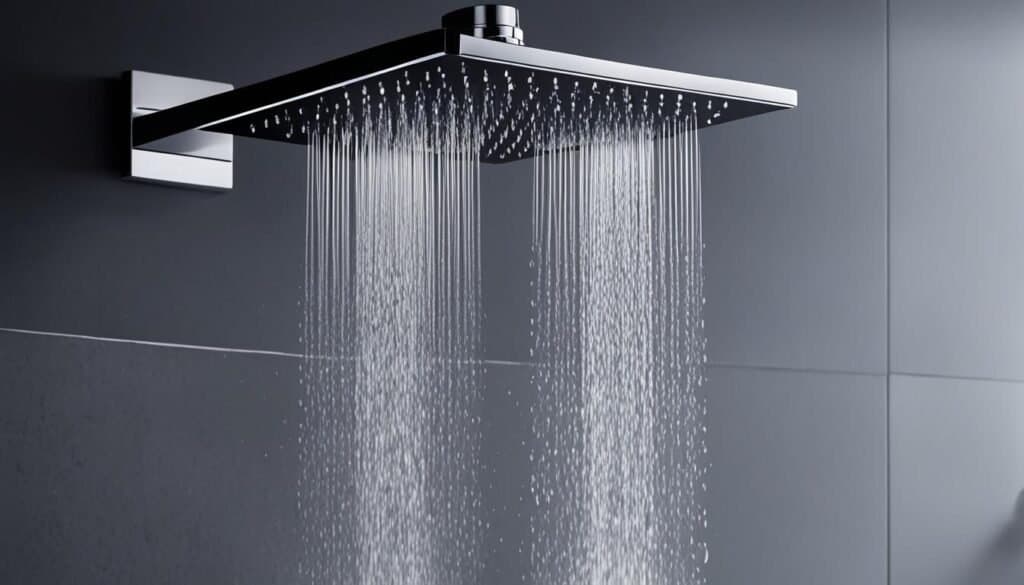
Let’s look at the numbers: Replacing a standard 2.5 gpm flow rate shower head with a water-efficient 2.0 GPM model catalyzed savings of more than 1,825 gallons of water annually for me. Considering the heated water this saved, it was a two-fold victory – lowering water consumption and reducing strain on my water heater. Families can expect even greater economic benefits, as the savings soar with more frequent use.
Embracing water saving products in the bathroom, such as modern aerators, not only adds to cost-effectiveness but also elevates your role in environmental stewardship. It’s clear that incorporating bathroom water savers is not just about following a trend but making a conscious lifestyle choice that benefits both the wallet and the planet.
Leaping to invest in a low-flow showerhead can have meaningful repercussions on my daily living expenses and the environment. The above table clearly shows how opting for a 1.5 gpm low flow showerhead is the pinnacle of water and energy prudence. Without a doubt, my foray into water-saving products has been a wise decision for both my home and the Earth.
Embracing Innovative Shower Features for Maximum Comfort
As someone deeply concerned with environmental conservation without sacrificing the creature comforts of home, I’ve turned my attention towards innovative shower features that enhance the bathing experience. A water-saving shower head is no longer just about reducing water usage; it’s about elevating the entire shower ritual with advanced technology and smart design.
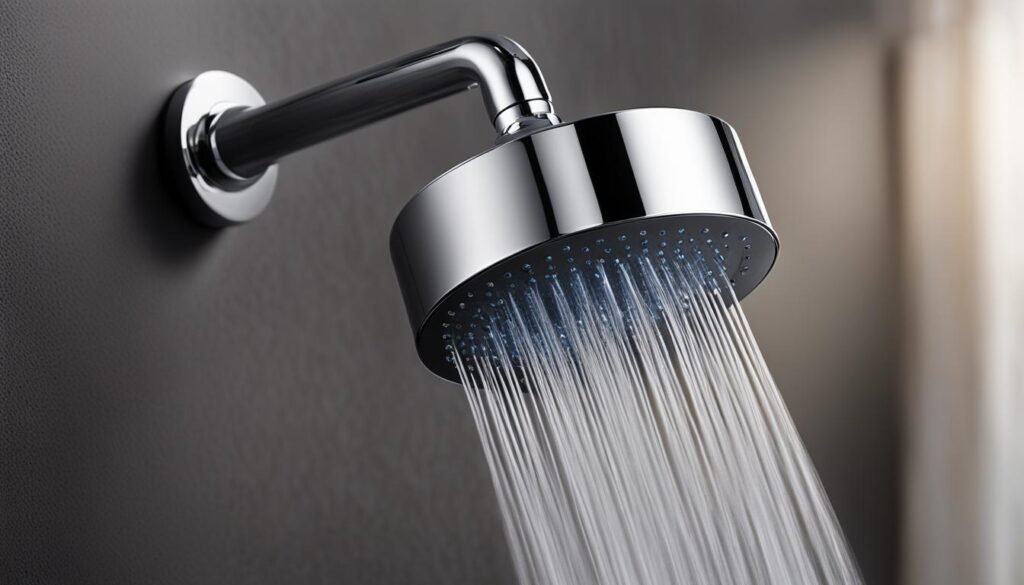
In the realm of low-flow showers, the introduction of PowerPulse Massage technology has been a game-changer. This feature is particularly beneficial for those with muscle tension seeking a therapeutic massage to unwind. Not all high-pressure shower heads are created equal, and models like Waterpik® stand out for delivering up to twice the massage force compared to other known brands, such as Moen and Delta.
Examining PowerPulse Technology for Therapeutic Benefits
What distinguishes PowerPulse technology lies in its ability to provide a high-pressure, pulsating massage without overconsumption of water. For individuals facing low water pressure, finding a shower head that offers an adjustable shower experience is paramount. PowerPulse meets this need precisely, maintaining water conservation while offering a luxurious touch through its targeted, larger water droplet design.
Comparing Spray Impact of Different Water-Saving Models
To illustrate the impact of innovative spray settings, let me present you with a comparison of different water-saving models. This analysis highlights the differences in spray quality, therapeutic benefits, and overall efficiency, ensuring you’re fully equipped to make an informed choice for your water-savvy yet comfort-driven lifestyle.
| Feature | Waterpik® with PowerPulse | Standard Low-Flow Shower Head |
|---|---|---|
| Massage Force | Twice the force for deeper penetration | Basic pressure with no therapeutic focus |
| Water Droplet Size | Larger for better coverage | Smaller, more dispersed droplets |
| Water Efficiency | High-efficiency with low GPM | Variable, not always optimizing flow and pressure |
| Adjustability | Multiple spray settings for personalized comfort | Limited settings; less flexibility |
In summary, it is clear that through features such as Waterpik®’s PowerPulse Massage, the modern low-flow shower no longer demands a compromise between conserving water and indulging in a high-pressure, luxurious showering experience. With a focus on therapeutic benefits and adjustable shower settings, these innovations cater to both your wellness and environmental responsibilities.
High-Efficiency Water-Saving Showerheads: The Ultimate Choice
As an advocate for a greener planet, I’m continually on the lookout for ways to integrate water-saving practices into daily life without losing out on quality. One such breakthrough has been the emergence of high-efficiency water-saving showerheads. My journey to a sustainable lifestyle has fundamentally changed by embracing eco-friendly showerheads that promise considerable water and energy savings. Not only do these efficient showerheads support water conservation efforts, but they also assure a pleasurable showering experience.
In my search for the perfect showerhead, I’ve discovered that options like 2.0 GPM or even 1.5 GPM models serve as a testament to the strides being made in the field of water saving technology. Choosing from a range of low water use showerheads ensured that my bathroom became an oasis of conservation and efficiency. I’m thrilled to share that such mindful choices no longer mean sacrificing luxury, as cutting-edge features like PowerPulse Massage by Waterpik® have wholly reinvented my shower ritual.
With these high-efficiency shower options, I am sincerely proud to be part of a movement that embraces responsibility towards our planet’s finite resources. And I must say, the notion that we must compromise our comfort for conservation is now a myth, thanks to today’s visionary showerhead technology.
Exploring Various Types of Water-Saving Shower Styles
With sustainability gaining momentum, I’m thrilled to delve into the world of high-efficiency water-saving shower styles available on the market. These innovative systems have been meticulously designed to cater to various user preferences while ensuring that indulging in a refreshing shower remains a guilt-free experience.
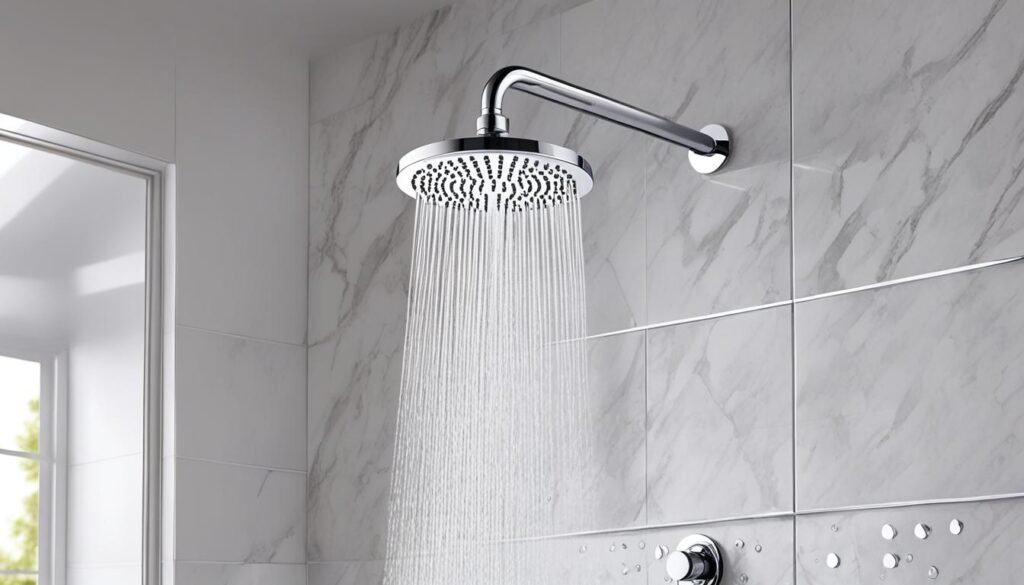
The Elegance of Fixed vs. Handheld Shower Heads
When considering a new shower system, one often evaluates the timeless fixed shower head against the versatile handheld shower head. Fixed shower heads are synonymous with stability and provide an uninterrupted water stream, perfect for a no-fuss shower routine. On the flip side, handheld shower heads are the epitome of flexibility, enabling you to direct the spray exactly where you need it, ideal for a dynamic, multi-purpose bathing experience.
Delving Into Rain and Ceiling-Mounted Options for Your Bath
Seamlessly elevating the ambiance of any bathroom, the rain shower head and ceiling mounted shower heads offer a luxurious shower experience akin to a serene, natural downpour. The broad coverage provided by these opulent styles is superb for those who wish to immerse themselves fully and unwind under a gentle cascade of water droplets.
| Shower Head Type | Water Efficiency | Flexibility | Experience |
|---|---|---|---|
| Fixed Shower Head | High | Low | Consistent, Stable Stream |
| Handheld Shower Head | High | High | Targeted, Personal Adjustment |
| Rain Shower Head | Varies | Low | Enveloping, Gentle Rainfall |
| Ceiling Mounted Shower Heads | Varies | Low | Spatial, Luxurious Downpour |
| Wall Mounted | High | Low | Traditional, Reliable |
| Dual Shower Heads | High | High | Versatile, Comprehensive Coverage |
Regardless of the choice, whether it’s a sleek wall-mounted unit, a dual shower head setup, or even an elegant ceiling-mounted fixture, each shower system is engineered to reduce water usage without compromising the quality of your bathing ritual. The duality of conservation and luxury allows for a profoundly satisfying and eco-conscious shower every day.
Essentials of Adjustable Spray Settings
When it comes to elevating my daily shower ritual, the luxury of adjustable spray settings on my showerhead makes all the difference. Having the flexibility to choose from a spectrum of spray patterns—from a gentle mist to a powerful water massage—allows me to tailor each shower to my current mood or necessity. The shower heads I use cater to a personalized and diverse type of shower experiences, which is why the versatility of these settings plays such a crucial role.
Moreover, it’s more than just a matter of personal comfort; having adjustable water settings means optimizing water efficiency as well. By shifting from an intense, powerful spray for a brisk rinse to a more subdued flow for a relaxing wash, I contribute to water conservation. This small adjustment notably reduces my household’s water consumption—perfectly aligning with eco-friendly initiatives while still ensuring a fully satisfying and customizable showering encounter.
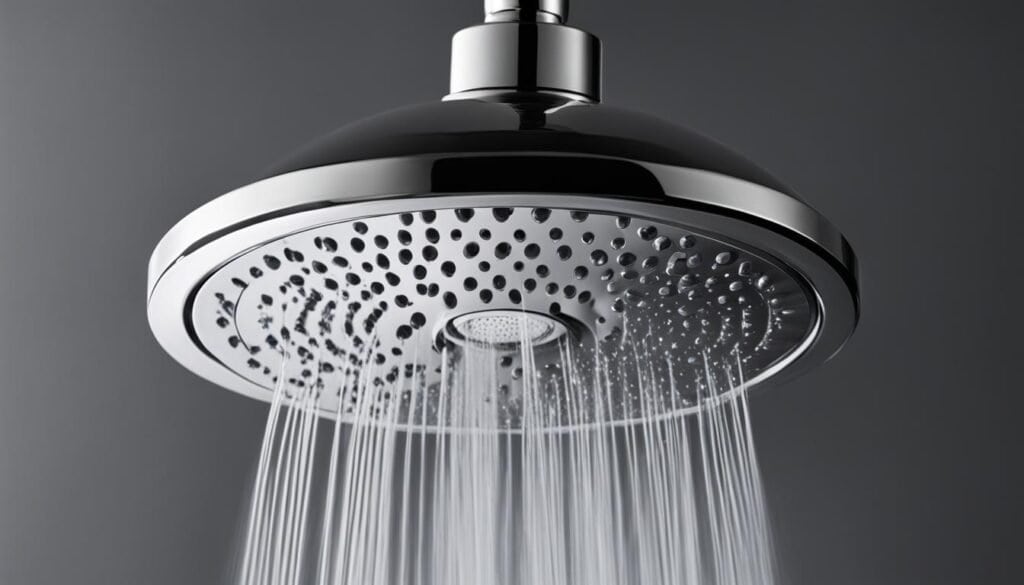
Adjustable spray settings on a showerhead represent the confluence of innovation and personalization—transforming a utilitarian daily task into a bespoke, water-wise indulgence.
| Spray Setting | Description | Intensity | Water Efficiency |
|---|---|---|---|
| Full Body | Even and enveloping spray for a refreshing cleanse | Medium | High |
| Invigorating Massage | Concentrated streams for a deep tissue massage | High | Medium |
| Mist | Light and airy for a soothing mist experience | Low | Very High |
| Power Rinse | Direct, powerful spray for effective rinsing | High | Low |
| Eco-Spray | Water-conserving flow for a sustainable shower | Adjustable | Very High |
Each time I step into the shower, the adjustable spray features on my flow showerhead deliver exactly what I need: be it rejuvenation, relaxation, or sheer efficiency. By simply selecting the ideal spray setting, my shower heads use the precise amount of water needed, reducing waste and saving precious resources without compromising on the quality of my shower experience.
How Water Pressure Preferences Determine Your Shower Head Choice
As someone passionate about the complete shower experience, I understand that water pressure plays a pivotal role in selecting the proper shower head. Whether you desire a high-pressure shower to invigorate and energize, or a low-flow shower head for a gentler touch, the right choice directly impacts your daily ritual.
For those of us who yearn for powerful water pressure to kickstart our mornings, specially designed showerheads amplify water flow per minute, providing a rejuvenating downpour even when the low water pressure from home plumbing might suggest otherwise. Conversely, with the advent of highly efficient models, achieving that high-pressure sensation without wastefulness is within reach.

Take a scenario where the household suffers from inherently low water pressure; the market now offers flow shower heads equipped with features that can boost pressure and create a full, revitalizing stream—this innovation ensures that no one must compromise on the showering experience.
Ultimately, matching your shower head to your personal preference in water pressure is not just about comfort—it’s about embracing a savvy lifestyle where efficiency and pleasure converge. Here is my run-down on how to align your choices with your unique needs:
- Test your current water pressure with a simple gauge to know exactly what you’re working with.
- Research showerheads that specialize in pressure-boosting for areas with low water pressure.
- Consider low-flow shower heads that offer a variety of patterns to simulate a more substantial flow.
- Remember that the specification of ‘water flow per minute’ is key in choosing a suitable model for your residence.
Armed with this information, I can guarantee that the path to an optimal selection—whether for an energizing blast or a serene cascade—is now clearer than ever. It’s the choice that ensures that every drop of water is delivered in a way that’s tailored just for you.
Integrating Showerheads into Your Bathroom’s Aesthetic
As I redesign my bathroom, the selection of a showerhead becomes an extension of my personal taste and the overall bathroom style. Whether I’m looking for a modern chrome shower head to complement a sleek and contemporary design, or considering a polished brass finish for a more traditional look, the options are vast and varied. It’s vital not just to think about the aesthetic but also the longevity and practicality of materials like stainless steel or brass, which are well-suited to withstand the humid conditions of a bathroom.
| Finish | Style Suitability | Features | Benefits |
|---|---|---|---|
| Polished Chrome | Modern/Minimalist | Shower head with hose | Easy cleaning and flexibility |
| Brushed Nickel Faucet | Classic/Industrial | Shower head set | Durable and masks water spots |
| Polished Brass | Traditional/Vintage | Fixed shower head | Timeless elegance and warmth |
| Stainless Steel | Modern/Professional | Adjustable shower head | Corrosion resistance |
In addition to the resilience of materials like brass or stainless steel, functionality intertwines with form when it comes to selecting a shower head. For instance, a shower head with hose offers flexibility for targeted water flow, while a complete shower head set delivers a unified look with all the necessary components for an exceptional shower experience.
Choosing the right showerhead is more than just a practicality; it’s about infusing luxury into the everyday and ensuring that every detail reflects my home’s style and grace.
The allure of polished chrome or the understated elegance of a brushed nickel faucet can significantly impact the overall ambiance of my bathroom. It is not just the appearance but the tactile feel, the way light dances off the surface, and even the sound of water droplets that play a part in transforming the space.
When making my decision, it’s crucial to look beyond the surface and to understand how the finish, whether it be polished brass or streamlined stainless steel, will interact with the environmental conditions and usage patterns of my bathroom. A thoughtful selection ensures that my chosen showerhead is not only a joy to use but also an integral piece of my bathroom’s aesthetic puzzle.
A Guide to Water-Saving Features and Eco-Friendly Practices
Incorporating water-saving features into our homes is more than a trend; it’s a necessary step towards sustainability. As someone who’s deeply invested in eco-friendly practices, I find that low flow rate showerheads and shower flow restrictors play a pivotal role in shower water conservation. They reduce water usage without sacrificing the quality of our shower experience. It’s crucial for us as consumers to understand the impact of our choices on the environment and our utility bills.
Water Conservation Without Compromising Shower Quality
Who says saving water means compromising on shower quality? The advancement in water saving showerheads ensures an invigorating shower by incorporating aerators and flow restrictors. These nifty devices help maintain water pressure, while managing to lower the amount of water used. In fact, many eco-conscious homeowners are surprised by how a simple change like installing a shower flow restrictor can maintain that sense of water abundance, while actively participating in water conservation efforts.
Understanding WELS Ratings for Efficient Water Use
Knowing the importance of the Water Efficiency Labelling and Standards (WELS) rating significantly aids in making informed decisions about water use. A WELS rating not only helps identify the most water efficient products but also ensures that these products meet strict performance standards.
These ratings guarantee that, despite low flow rates, the showerhead does not exceed 2 gallons per minute (GPM), a benchmark for efficient water use while ensuring a satisfactory shower quality. This simple piece of knowledge can lead to long-term savings and a reduced ecological footprint.
| Feature | Water Savings | Shower Experience | Environmental Impact |
|---|---|---|---|
| Aerators | Significant reduction in gallons per shower | Comfortable pressure and spray consistency | Lesser water drawn from municipal supply |
| Low Flow Rate Showerheads | Max 2 GPM, leading to lower water bills | Optimized for water efficiency without comfort loss | Reduced energy consumption via less hot water heating |
| Flow Restrictors | Controlled flow, preventing waste | Maintained overall feel of water strength | Minimized water treatment and heating emissions |
Embracing these eco-friendly practices and integrating water-saving features such as showerheads with a favorable WELS rating into our daily life contributes significantly to the planet’s well-being and helps with water bill savings. My personal experience and ongoing commitment to an eco-friendly lifestyle have shown me the immense benefits and easy adaptability of such products. These efficient shower solutions reinforce our daily efforts in shower water conservation and ensure that we don’t have to compromise on the quality of our daily rituals to protect our planet.
Decoding the Finishes: From Chrome to Brushed Nickel
When I ponder the aesthetic of bathroom fixtures, the finish is as critical as the design itself. Each finish, from the shiny allure of chrome to the muted elegance of brushed nickel, not only complements the bathroom decor but also defines its longevity and ease of upkeep. Let’s delve into the distinctive qualities these finishes bring to the table in the realm of high-efficiency, water-saving showerheads.
Making a Statement with Black or Brushed Brass Gold Accents
The bold, contemporary look that black shower heads deliver is undeniably striking. They stand out, transforming the shower into a focal point of modernity and sophistication. On the other hand, brushed brass gold finishes exude a sense of opulence, their warm hue bestowing a vintage luxury that’s very much in vogue. Both choices speak to a desire for statement pieces in the bathroom that do more than function—they captivate.
Choosing the Enduring Appeal of Matte White and Stainless Steel
For admirers of minimalist design, matte white finishes offer a pristine cleanliness that brightens the smallest of spaces. It’s a refreshingly simple yet impactful choice for bathroom decor. In the quest for durability and corrosion resistance, stainless steel shower heads stand peerless, particularly in hard water regions. Their resilience against tarnishing ensures your investment remains visually appealing and functionally enduring for years to come.
Conclusion on High Efficiency Water Saving Shower Heads
As we reach the end of our exploration, it’s clear that the choices we make in our homes echo far beyond our personal spheres, especially with something as routine as showering. Opting for sustainable showerheads is more than a minor adjustment; it’s a significant stride towards an eco-conscious lifestyle. Showerheads that balance water-saving practices with extraordinary design are not just a nod to the environment; they’re an upgrade to our daily rituals.
Investing in a Sustainable Future with the Right Showerhead
By selecting eco-option showerheads, I’m making a commitment to the planet—and to futurity. The impact of these earth conscious showerheads extends beyond the confines of my water bill. They diminish the environmental footprint, decease utility costs, and preserve our most treasured resource, water. The enhancements made in the engineering of these planet friendly showerheads compensate for any changes in water flow, ensuring that I can relish a revitalizing shower without compromise.
Refreshing Your Routine: The Lasting Benefits of High Efficiency Showers
The journey to a sustainable lifestyle isn’t arduous; it can start with the simple action of choosing a low impact showerhead. This selection ushers in a cascade of benefits: less water used, lower energy consumption, and a continuity of indulgence in your daily shower. By embracing water-saving practices in my own home, I join a growing movement that values resource conservation. Envisage the cumulative effect if we all shifted towards high efficiency showers—it’s a wave of positive change that starts in your bathroom and swells to global dimensions.
FAQ on Low-Flow Shower Heads
Q: What is the importance of the flow rate in a water-saving shower head?
A: The flow rate, usually represented in gallons per minute (gpm), signifies the volume of water a showerhead can deliver in one minute. Lower rates like 1.5 gpm or 1.25 gpm contribute to water and energy conservation as they use less water compared to a standard shower head with a rate of 2.5 gpm.
Q: How does a low flow showerhead help conserve water?
A: A low flow showerhead such as a 1.5 gpm showerhead, effectively reduces the amount of water used during a shower. These showerheads use advanced technology to provide the feel of a high pressure, standard shower while using less water. This significantly contributes to water conservation.
Q: Why is Niagara Conservation a popular choice for high-efficiency showerheads?
A: Niagara Conservation is renowned for manufacturing some of the best low flow shower heads on the market. Their products are known to maintain a high-pressure output, even at low flow rates like 1.8 gpm or 1.25 gpm. They are also easy to install, making them a top pick among consumers.
Q: How does an adjustable shower feature contribute to water conservation?
A: An adjustable shower feature allows users to control the water flow rate according to their preferences. This leads to less water waste, particularly when one does not require a high pressure output. It also optimizes the shower experience, making an adjustable shower head a top choice for a water-saving shower head.
Q: How can a high pressure shower head be water efficient?
A: High pressure doesn’t necessarily mean high water usage. Many high-efficiency showerheads on the market today, like those from Niagara Conservation, utilize water-aerating techniques to maintain high pressure while reducing the flow rate. These showerheads provide the effect of a standard shower using less water.
Q: How much water can I save by switching to a 1.5 gpm low flow shower head?
A: A flow rate of 1.5 gpm uses a gallon less per minute compared to a standard shower head with a 2.5 gpm. If your regular shower lasts for 10 minutes, this switch can save 10 gallons of water per shower. It doesn’t just conserve water, it also saves the energy required to heat the water.
Q: Can I achieve a decent flow rate with a shower head set even under low water pressure conditions?
A: Yes, many of the best low flow shower heads are designed to function well even under low water pressure conditions. Their mechanics enable them to utilize the available pressure to the fullest, providing an efficient water flow rate and thus a satisfactory shower experience.
Q: How is the chrome shower head related to hard water conditions?
A: Chrome shower heads, whether a polished chrome or chrome finish, are not only stylish, but are also equipped to handle hard water conditions. Chrome’s non-porous property prevents mineral build-up, which is a common issue with hard water, thus prolonging the shower head’s life and maintaining a consistent flow.
Q: Can water-saving showerheads be installed on any faucet?
A: Most water-saving showerheads are designed to be compatible with standard faucets and can be easily fitted where the head of the regular shower head was in place. The showerhead packaging usually states whether it can be installed on a particular faucet or not. Therefore, it’s advisable to check this before purchase.
Q: How does using a low-flow showerhead affect my water heater?
A: A low-flow showerhead, such as 1.5 gpm or 1.25 gpm showerhead, requires less water and the energy to heat this reduced volume. This means your water heater does not need to work as much as with a standard shower head, potentially prolonging its life and helping conserve energy.

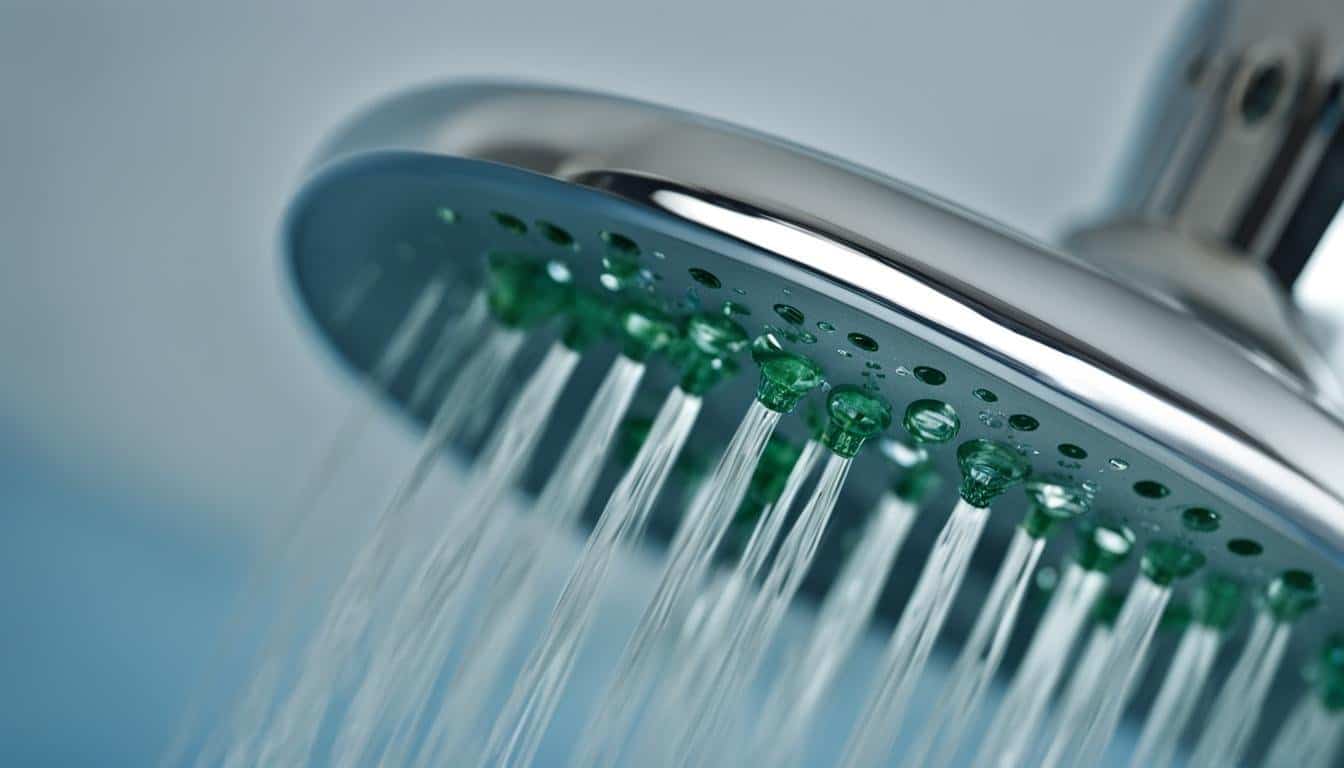



Leave a Reply